托福听力讲座中的问答环节
托福lecture怎么听-托福听力lecture常见技巧
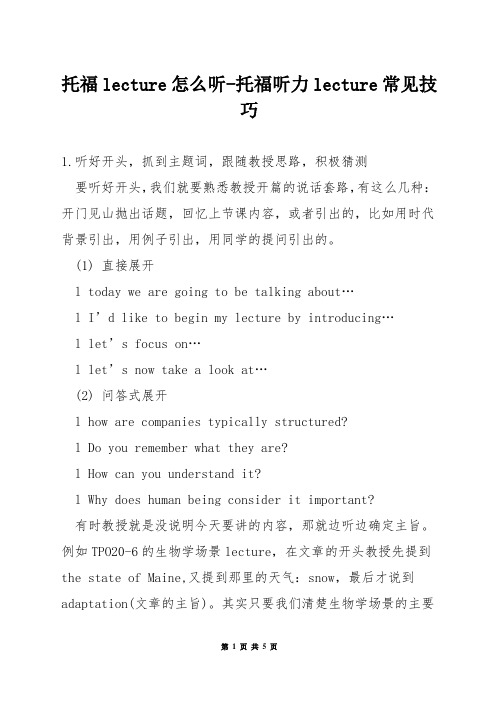
托福lecture怎么听-托福听力lecture常见技巧1.听好开头,抓到主题词,跟随教授思路,积极猜测要听好开头,我们就要熟悉教授开篇的说话套路,有这么几种:开门见山抛出话题,回忆上节课内容,或者引出的,比如用时代背景引出,用例子引出,用同学的提问引出的。
(1) 直接展开l today we are going to be talking about…l I’d like to begin my lecture by introducing…l let’s focus on…l let’s now take a look at…(2) 问答式展开l how are companies typically structured?l Do you remember what they are?l How can you understand it?l Why does human being consider it important?有时教授就是没说明今天要讲的内容,那就边听边确定主旨。
例如TPO20-6的生物学场景lecture,在文章的开头教授先提到the state of Maine,又提到那里的天气:snow,最后才说到adaptation(文章的主旨)。
其实只要我们清楚生物学场景的主要考点:动物、植物、生物科技相关话题。
就不难推断出文章真正的主旨,2. 剖析正文的常用结构,熟悉考点位置正文有不同的展开形式。
有教授的独角戏,有教授的大部分独白加上几处师生互动,也有通篇都是互动的讨论性讲座,只不过较少。
所以我建议把正文可以分出互动和独白的两个部分,来剖析结构。
1)互动部分:第一种结构是教授提问,主动权在教授手里,课堂还是沿着教授思路往后推动;第二种结构中同学的提问打断了教授的思路,教授要去回答同学的问题,改变了原有的思路,教授会沿着同学的提问内容展开。
2)独白部分,也就是教授一个人在讲述要点,讲座中往往有好几处独白,这些独白有一定的结构特征。
托福听力tpo66section1 对话讲座原文+题目+答案+译文
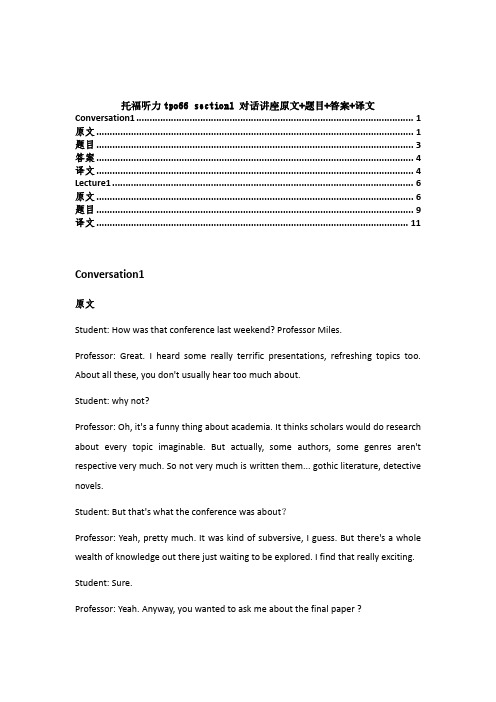
托福听力tpo66section1对话讲座原文+题目+答案+译文Conversation1 (1)原文 (1)题目 (3)答案 (4)译文 (4)Lecture1 (6)原文 (6)题目 (9)译文 (11)Conversation1原文Student:How was that conference last weekend?Professor Miles.Professor:Great.I heard some really terrific presentations,refreshing topics too. About all these,you don't usually hear too much about.Student:why not?Professor:Oh,it's a funny thing about academia.It thinks scholars would do research about every topic imaginable.But actually,some authors,some genres aren't respective very much.So not very much is written them...gothic literature,detective novels.Student:But that's what the conference was about?Professor:Yeah,pretty much.It was kind of subversive,I guess.But there's a whole wealth of knowledge out there just waiting to be explored.I find that really exciting.Student:Sure.Professor:Yeah.Anyway,you wanted to ask me about the final paper?Student:Yeah,which I see now ties into the theme of that conference,since we're supposed to write about a book from one of those lesser genres.I was wondering what about science fiction?Professor:Sure.Though it's a genre that's actually getting more and more respect within academia.There was even a talk at the conference about Jack Vance.Student:He wrote planet of adventure,right?Professor:Yeah.He's a well-researched respected science fiction writer.If you're interested in science fiction,you could look them up.That leads you to lots of other authors and lots of possibilities for your paper.Student:Great.I'm relieved you think that,that's a good genre to study.I'll find a book that interests me and do the paper on that.It seems like most people assume that science fiction is kind of like,I don't know,junk literature.Professor:Yes,a lot of people do.Student:Yeah,but I've read somethings and I think that some of it is really well written and it takes so much imagination to write SCI-Fi.Professor:Well,careful,though,there is a difference between science fiction and Scifi.Student:What do you mean?Professor:SCI fi,that's what you tend to see in films.It has all the spaceships and robots,and it focuses on exotic technology you know factor like special effects,at the expense of a well written story.I think a lot of people don't realize this and tend not to make a distinction.Student:Okay.Professor:But true science fiction is much more intellectual than that. The story is very important,and even though it might take place in an imaginary world,it might have exotic gadgets.The focus is on the plot.Science fiction creates metaphors about our world.And well what it means to be human.It's meant to getpeople to think about real things like history and human behavior.That's worthy of your time,but not SCI fi.Student:Great.Well.Can I let you know next week which book I want write about?Professor:Sure.题目1.Why does the man go to see the professor?A.To find out what the assignment is for the final paperB.To discuss a conference that the professor attendedC.To get a topic area approved for a class assignmentD.To find out the difference between science fiction and sci-fi2.What was unusual about the conference that the professor attended?A.It included presentations by many scholars who were not well known to the professor.B.It included presentations by students.C.It focused on authors who are respected by most scholars.D.It focused mostly on less popular literary genres.3.Why does the professor mention Jack Vance?[Click on2answers.]A.To encourage the man to write a paper about Planet of AdventureB.To support her point that some authors should be researched moreC.To indicate a way for the man to begin looking for a suitable topicD.To demonstrate that science fiction is gaining attention from scholars4.What is the man’s attitude toward science fiction?A.He is confident that it will become more respected.B.He disagrees with a commonly held opinion about it.C.He understands why it is not well respected.D.He is impressed that it includes exotic technology.5.According to the professor,what is a key difference between sci-fi and science fiction?A.Sci-fi is intellectually more challenging than most science fiction.B.Science fiction stories are often made into films.C.Science fiction places more importance on plot than sci-fi does.D.Science fiction makes little use of exotic technology.答案C D CD B C译文1.学生:上周末的会议如何,Miles教授?2.教授:很好,我听到了很多非常精彩的演讲,以及令人耳目一新的话题,而且这些话题平时都没机会听到。
托福听力tpo67section1 对话讲座原文+题目+答案+译文
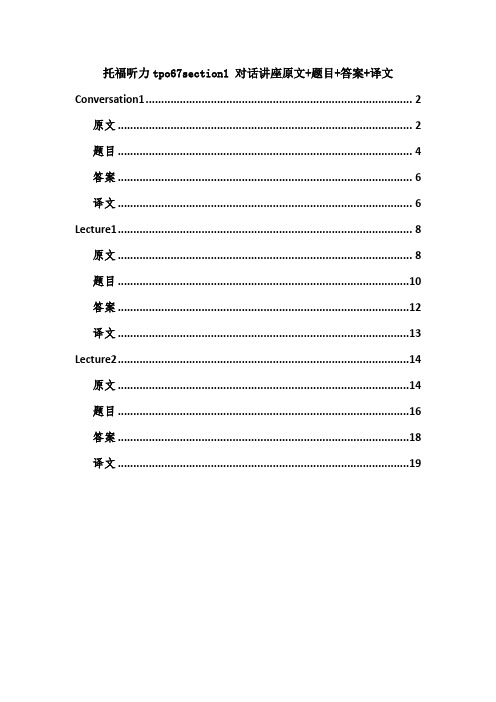
托福听力tpo67section1 对话讲座原文+题目+答案+译文Conversation1 (2)原文 (2)题目 (4)答案 (6)译文 (6)Lecture1 (8)原文 (8)题目 (10)答案 (12)译文 (13)Lecture2 (14)原文 (14)题目 (16)答案 (18)译文 (19)Conversation1原文Student: Hi. I know it's Friday afternoon and all, but this is kind of an emergency.Supervisor: Oh, what kind of emergency? Exactly?Student: Well, I mean, there's no danger or anything. It's like a personal emergency. It's about my apartment.Supervisor: Well, I really only deal with dormitories. The apartment facilities, supervisors, offices, next door room, 208 ask for Jim.Student: I just came from there. They sent me to you. It's a problem with my stove.Supervisor: And they sent you here. All right. Now, what's the problem?Student: My stove isn't working at all. It won't even turn on.Supervisor: It's electric?Student: Yes.Supervisor: Okay, our electrician is out today, his daughter is getting married tomorrow. So realistically he probably won't get to it until Monday afternoon. Perhaps Tuesday.Student: Really, we have to go without a stove for a whole weekend, possibly more?Supervisor: Yes, as you pointed out, this is not a dire emergency, so it's going to be handled under the normal maintenance schedule, which is Monday through Friday. And I know for a fact that Monday is already pretty tight, the electrician will have a lot to catch up on. So when I say possibly Tuesday, I'm just trying to be realistic.Student: But I really rely on that stove. I don't have any kind of on campus dining arrangement or contract.Supervisor: Well, I understand, but …Student: And it's not even the whole problem. I'm expecting a bunch of people to show up tomorrow night. I'm going to be hosting a meeting of the editorial staff of the school paper. And a dinner was scheduled.Supervisor: Now I see which you meant by a personal emergency, but all I can really do is put in a work request. I'm sorry.Student: I just got finished shopping for all the food for the meeting. Ah. I guess, I'll just have to call it off.Supervisor: Why would you cancel the meeting?Student: Well, I mean, I could do it next week.Supervisor: Couldn't you like use a neighbour or something?Student: I don't think so. I mean, the only neighbors I really know, well enough to ask the guys next door, if you saw the state of that kitchen, you'd understand. I'm not sure I could find the stove under all the mess.Supervisor: I see. Well, we could try to set you up in one of our conference rooms in the Johnson building.Student: Really? I thought that student groups couldn't book the rooms in Johnson.Supervisor: Well, normally they can't. However, given your situation, I can try to put in a word with some people and see if we can make an exception here. There is also a full kitchen in the Johnson building, so you'd be covered there.Student: Okay. Yes. That definitely would work. Um. Do you have any idea when you know if you can make this happen or not? Because I'll need to let people know.Supervisor: Yeah, I understand people need to know what's going on. Um. Let me get back to you in an hour or so on this. Can you leave me your phone number?Student: Sure. Thanks.题目1.Why does the woman go to see the facilities supervisor?A. To find out where there is a stove that she can useB. To complain about her treatment in another facilities officeC. To ask if a meeting can be moved to another locationD. To schedule repairs for a broken appliance2.Why does the woman believe that her problem is a serious one?[Click on 2 answers.]A. She does not have an on-campus option for meals.B. She is concerned that the stove could be dangerous.C. She knows that other students have had similar problems.D. She was relying on using the stove for an upcoming event.3.What will the woman probably do next?A. Request an emergency repair for her stoveB. Prepare a meal that does not need to be cookedC. Move her event to a different locationD. Reschedule her event to the following week4.What does the woman imply about her next-door neighbors?A. Their kitchen is too dirty for her to use.B. Their stove is not functioning properly.C. They do not let other people use their stove.D. They will be using their kitchen this weekend.5.What can be inferred about the supervisor when he says this:Student: I just got finished shopping for all the food for the meeting. Ah. I guess, I'll just have to call it off.Supervisor: Why would you cancel the meeting?Student: Well, I mean, I could do it next week.A. He feels sorry for the woman.B. He believes that the woman's plan of action is not necessary.C. He wants to know the reason for the woman's decision.D. He wants the woman to confirm her plan.答案D AD C A B译文1.学生:嗨。
托福听力十大对话结构解析

托福听力十大对话结构解析托福听力十大对话结构解析下面店铺就给大家带来托福听力十大对话结构的解析,希望能对大家有所帮助!一、对话的结构1.对话主题2.问题原因3.老师要求4.学校要求5.语气转变6.老师建议7.问题结果8.研究调查9.对话结果10.师生约见二、结构详解1. 对话主题对话的主题一般在最开始就会给出,所以一定要听第一句话。
有时候也会有寒暄,之后要注意听学生说(my problem/my question is …)(I was wondering…., I was hoping…)类似这样的句子。
一般都是引出主题的地方。
2. 问题原因一个学生去找老师,一定是为了解决某个问题,而这个问题一定是有原因的,原因几乎每次都会考。
所以大家一定要注意听因为所以的词,这个可以参照讲座的词汇。
3. 老师要求老师给学生讲解的过程中,一定会提到作业要求,那么这个要求一般是会考到的。
所以大家要注意听requirement, you need to…, you should have….这样的字眼。
4. 学校要求这个和上个类似,例如毕业的要求,住宿的要求,图书馆借书的`要求,都是肯定出考点,一定要注意听,特别是requirement等等的词汇。
5. 语气转变这个基本是定律了,语气转变类似于:Wow! You know what? Guess what? Actually…, To tell you the truth…, Listen….6. 老师建议老师的建议,解决方案是肯定会考到的。
7. 问题结果对话的第五题或者第四题,喜欢考对话的结果,就是这个问题是怎么处理的,是否成功等等。
8. 研究调查凡是对话中出现,调查,研究类似的信息,一定是会考的,而且会考,为什么要提到这些研究,大家以后记住,只要选支持主题的选项就可以了。
9. 师生约见10.额外信息这个考察的是结束对话后老师和学生约下次见面时间,有时候会说见面的内容,那么这个内容一般会考到。
托福听力对话和讲座出题点对应各题型细节精讲
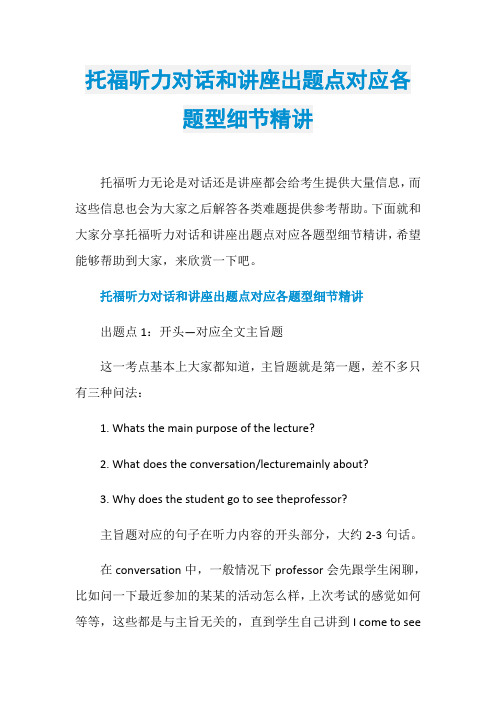
托福听力对话和讲座出题点对应各题型细节精讲托福听力无论是对话还是讲座都会给考生提供大量信息,而这些信息也会为大家之后解答各类难题提供参考帮助。
下面就和大家分享托福听力对话和讲座出题点对应各题型细节精讲,希望能够帮助到大家,来欣赏一下吧。
托福听力对话和讲座出题点对应各题型细节精讲出题点1:开头—对应全文主旨题这一考点基本上大家都知道,主旨题就是第一题,差不多只有三种问法:1. Whats the main purpose of the lecture?2. What does the conversation/lecturemainly about?3. Why does the student go to see theprofessor?主旨题对应的句子在听力内容的开头部分,大约2-3句话。
在conversation中,一般情况下professor会先跟学生闲聊,比如问一下最近参加的某某的活动怎么样,上次考试的感觉如何等等,这些都是与主旨无关的,直到学生自己讲到I come to seeyou because I have a problem/question that...这之类的话,这时候就要注意听,拿笔开始记了,学生所讲到的就是全文的主旨。
在lecture中,professor一般会先回顾上节课所学的内容,会讲一大段,这些都是无用信息,完全不用听,一般是Last class we talked about/discussed/focused on...这个部分教授要么是讲得很快,要么是专业术语特别多。
重点在后面,当讲到today we will continue/shift to/focus on..., 这里就要开始记录了,professor开始讲这节课要学的内容了。
出题点2:结尾—对应倒数第2、第3题ETS非常喜欢在结尾出题,就是进度条快走到头的时候,这时候千万别松懈。
美国人一贯总分总逻辑结构,开头结尾都是非常重要的。
托福听力tpo39 section2 对话讲座原文+题目+答案+译文
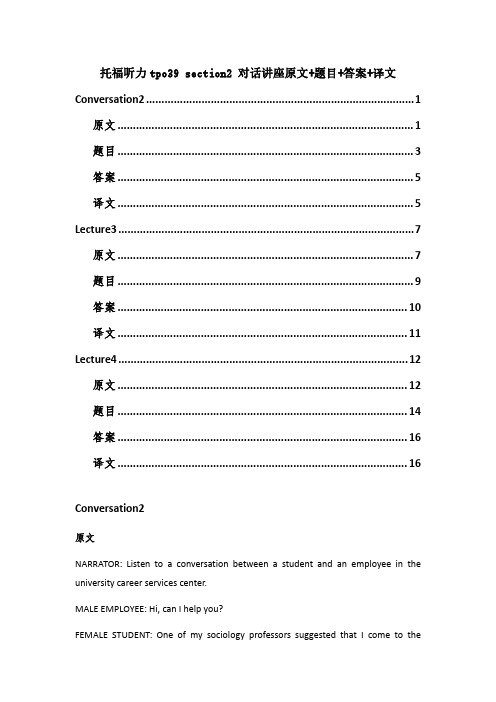
托福听力tpo39section2对话讲座原文+题目+答案+译文Conversation2 (1)原文 (1)题目 (3)答案 (5)译文 (5)Lecture3 (7)原文 (7)题目 (9)答案 (10)译文 (11)Lecture4 (12)原文 (12)题目 (14)答案 (16)译文 (16)Conversation2原文NARRATOR:Listen to a conversation between a student and an employee in the university career services center.MALE EMPLOYEE:Hi,can I help you?FEMALE STUDENT:One of my sociology professors suggested that I come to thecareer services center and talk to you.She thought there was going to be a career fair soon,where I could talk to different companies about a possible summer job.MALE EMPLOYEE:Well,there's our classroom-to-corporation career fair….That's our largest fair every year.We get representatives from over100companies—and they actually conduct interviews right here on campus.FEMALE STUDENT:Great,what kinds of companies?MALE EMPLOYEE:Uh,this year we'll have representatives from all the major technology companies in the area.FEMALE STUDENT:Oh,then I don't know how helpful that’d be…I’m a sociology major.MALE EMPLOYEE:Well,that's fine.Sociology students often get jobs in marketing, administration,human resources—tech companies have openings in those areas…FEMALE STUDENT:Well,I'm mainly interested in working with people,in human services…MALE EMPLOYEE:Well,in that case,we do have a smaller fair coming up,with smaller companies and some public-service organizations—this one might be a better fit for you.FEMALE STUDENT:Yeah,I think that's the one my professor was talking about.MALE EMPLOYEE:Most likely.Now,have you been to a fair like this before?FEMALE STUDENT:Not really.But I just show up and talk to different companies, right?I don’t have to register or anything,do I?MALE EMPLOYEE:No,you don’t have to register,but I highly recommend that you come prepared.FEMALE STUDENT:Prepared?MALE EMPLOYEE:You should dress professionally and have copies of your résuméwith you.FEMALE STUDENT:Copies of my résumé?Do I really need that?MALE EMPLOYEE:Well,it's not a requirement.But a lot of students come to our career fairs—plus,we’ve opened up these fairs to the public,to people in the neighboring communities.So anything you can do to make yourself look more—well, look more professional,that’s going to set you apart from the other job applicants.FEMALE STUDENT:Hmm,I don't even have a résumé.I’ve never written one before.MALE EMPLOYEE:Oh,that's not a problem at all.Have you been to our new Web site? It has all sorts of information about how to write a résumé.And once you've written it,you can make an appointment to bring it in to us at the career services center and have someone look at it with you.FEMALE STUDENT:OK,so I really need to have a résuméjust to get a summer job?MALE EMPLOYEE:Well,that depends on the company,but it's a good idea to have one.FEMALE STUDENT:OK,I guess I'll need to have one sooner or later anyway…MALE EMPLOYEE:Oh,and we'll be adding other information to our Web site eventually…uh,like we'll have a list of the companies that're going to be at the career fair by the end of the week.You should check it out,and then maybe do some research on the companies.That should help you when you talk to them,too.题目1.What is the conversation mainly about?A.How to register for an upcoming job fair.B.The woman's career goals.C.How the woman should prepare for an upcoming event.D.Possibilities for summer jobs on campus.2.Why does the woman think she will prefer the smaller job fair?A.She will have more time to prepare for it.B.The jobs available there are more suited to her interests.C.One of her sociology professors helped organize it.D.Fewer people will be looking for positions there.3.Initially,what was the woman's attitude toward preparing a resume?A.She was concerned that it would take too much time.B.She did not think it was necessary.C.She did not think she could do it by herself.D.She was certain that it would help her find a summer job.4.Why does the man mention that the career fairs are now open to job applicants from the community?A.To show that the number of available jobs in the community has increasedB.To indicate that the woman will be able to talk to people who have job experienceC.To indicate that the career services center is funded by the local governmentD.To hint that competition for the available jobs may be high5.What does the man say the woman will be able to do on the career services center's Website?[Click on2answers.]A.Find out which companies will be participating at the eventB.Register for the upcoming career fairC.Learn tips on how to prepare a resumeD.Get suggestions for how to make a good impression during an interview答案C B BD AC译文旁白:请听一段学生和大学就业服务中心的雇员的对话。
托福听力对话和讲座中的13个细节知识
托福听力对话和讲座中的13个细节知识都说托福听力中有套路,但很多同窗对这些套路只是其实理解得并不够全面细致,还是有很多原本能够成为解题线索的中央并没有控制。
下面就由小编汇总解说托福听力对话和讲座中的13个细节学问。
托福听力对话和讲座中的13个细节知识托福听力对话讲座细节学问汇总1、conversation:段落开头提到的缘由必考:problem/question。
2、段落开头提到的本次主题必考(如T oday……),段落结尾的点评和总结必考。
3、段落中反复两次的中央必考。
通常为本节课的要点,师生各反复一次的中央必考,留意在笔记中划双线,反复两次的名词必考,普通反复的名词是选项中的交换词。
4、段落中的强调句型多引出分论点,是考点:This is the first time…One thing important is…The most important thing…You should remember/notice/bear inmind/keep in mind---conversation引出倡议的句型。
5、针对上下文化显的肯定或者否认的答复必考:definitely,absolutely, exactly, it’s a good question, excellent question, 留意听好教授在这些答复之后的解释,一定会对重要内容作同义的反复。
6、段中主论点下有定义加举例的必考(配对表格题);罗列多个事实处必考(是非型表格题);阐明多个程序、步骤的必考(排序题),中间的步骤一定留意:then, so, ok, well, replace, the next stage.7、难点的解释阐明必考(中心概念):小黑板,带字的笔记本,只需出小黑板都会有停顿。
留意引导词:it refers to, that is, that means, which means, This is to say, inother words, in another words, by that he meant, let me make it clear, let memake it simpler, let’s put it this way.8、段中援用的观念必考,对应都是对分论点的见地:think,argue,believe,一定有小黑板,或者人物肖像。
托福听力对话conversation题型精讲
千里之行,始于足下。
托福听力对话conversation题型精讲托福听力对话题型主要有五种:具体问题、主题概括、态度推断、细节理解和听力推理。
下面将针对这五种题型进行分析和讲解。
具体问题:具体问题是对对话中提到的具体信息进行提问,与对话内容直接相关。
这种题型的关键是要认真听清并理解对话中的细节信息,特殊是数字、时间、地点等具体信息。
在回答问题时,可以通过抄写这些具体信息来挂念理解,然后在选项中查找与之相符的答案。
例题:What is the man's problem?解析:这是一个典型的具体问题,答案会在对话中直接提到。
要找到答案,首先要弄清楚问题是关于什么的,然后听清问题的答案部分。
在这个例题中,问题问的是男人的问题,并且在对话中询问男人的问题。
在听到问题的答案时,可以马上选出正确选项。
主题概括:主题概括题要求考生对对话的主要内容进行概括,并从选项中选择一个与概括最相符的答案。
在听对话时,要关注对话的中心内容和主旨,留意对话中消灭的关键词汇和信息,以及对话的目的和意图。
例题:What is the main topic of the conversation?解析:这是一个主题概括题,需要对对话的主要内容进行概括。
在听对话时,要留意对话中消灭的关键词汇和信息,以及对话的目的和意图。
通过对话的语气和语境的把握,可以理解对话的主要内容和主题。
第1页/共3页锲而不舍,金石可镂。
态度推断:态度推断题要求考生依据对话中的语气、语调等提示信息,推断说话者对某人或某事的态度。
在听对话时,要特殊关注说话者的情感表达和语气变化,留意表示态度的词汇和语法结构,如副词、形容词等。
例题:What does the woman think of the new restaurant?解析:这是一个态度推断题,需要推断女人对新餐厅的态度。
在听对话时,要留意女人说话的语气和语调,留意表示态度的词汇和语法结构。
通过对话的整体感觉和女人说话的情感表达,可以推断出她对新餐厅的态度。
托福听力百问百答
专家在线:托福听力百问百答编者语:很多考生马上就要进行第四季度的托福考试了,托福听力在整个托福考试中既是重点又是难点,所以,小编在这里搜集到一些名师和考生的互动内容,希望对大家有帮助。
问1:我马上要考试了,心里七上八下的,也没心复习。
不知我在等待期间该复习什么,请指点。
我的情况是听力很差,但我的老托听完了,所有手边的练习也都做了,包括BARRON、DELTA、OG等。
现在,我该做什么呢?该怎么学呢?该使用什么材料更好一些呢?答1:(1)没等着考试时,考试之前在做着什么,现在仍然需要做什么;如果你现在不知道做什么,说明你的之前的备考存在问题。
(2)马上接近考试日期的人和中长期备考的人的区别不是选取材料的不同,更不是采取学习方法的不同,而是——心态的不同。
如果你还有一个月考试,那么你的压力更大,投入的需要更多;如果你还有三个月才考试,那么你的压力明显没有即将考试的人大,而且一定不会有时间放松或放纵自己。
简而言之:学习方法都一样,材料都一样,但是马上面临考试的人一定比中长期准备的人要更节制自己,更珍惜时间,更努力。
(2)什么时候考试是你把握不了的,你努力的着急或没心思复习都是没有用的;但以什么样的实力去考试是可以把握的,你只着急却不努力提高实力是没有用的(3)你的老托听完了?怎么听的?听完后得到了什么?缺陷都找到了并弥补上了吗?过程上听完不重要,重要的是听完后有什么结果!(4)手边的练习也都做了?怎么做的?只是对了答案?还是认真分析题目及文章?(5)如果以上的材料都是用心完成的并都有所得,那么恭喜你,你不需要再准备了;但如果以上的材料你只是做过而已,那麻烦你想清楚自己做材料的目的是什么?为了得到什么?和已经得到什么?问2:我总是听得特慢怎么办啊?短些的句子听1、2遍就写下来了,长句子大概听4遍,然后对原文,然后再听一遍,然后写第二句……听完一整遍再通篇听一遍同时记笔记,可是为什么我3、4个小时根本听不了几篇啊?是不是有什么地方不对的?哪个环节太慢了?还有,为什么我跟家听写听得挺好,可一上课做题就做得一塌糊涂的?我发现上课做题的时候我边听边记,可是记了前面的后面的就落下听不着了,这个是不是速记能力的问题?每天练听写能练出来吗?还是需要别的练习呢?每次上课的时候我都觉得我两只耳朵化作一缕青烟消失不见了……答2:(1)你的最主要的问题就是句子一念,你记了前落了后,我们可以称为:听力型瞬间失忆。
托福听力tpo68全套对话讲座原文+题目+答案+译文
托福听力tpo68全套对话讲座原文+题目+答案+译文Section 1 (2)Conversation1 (2)原文 (2)题目 (4)答案 (7)译文 (7)Lecture1 (9)原文 (9)题目 (12)答案 (15)译文 (15)Lecture2 (18)原文 (18)题目 (21)答案 (24)译文 (25)Section 2 (27)Conversation2 (27)原文 (27)题目 (30)答案 (33)译文 (33)Lecture3 (35)原文 (35)题目 (39)答案 (41)译文 (42)Section 1Conversation1原文Student: Hi i'm i'm, i'm, Randy Beecham. I really need to speak with professor Clark right away. Could you get me into see her?Assistant: Well, she is conducting oral exams right now, I can't interrupt her. The exams began at 8:00 this morning and are scheduled to go on all day.Student: But I was supposed to take my oral at 9 this morning, and well I don't know what happened, my alarm clock didn't go off for some reason and I overslept.Assistant: Oh dear!Student: I know it's like, really embarrassing, when I open my eyes and saw with already 9:30 I just got here as fast as I could.Assistant: Well,since you didn’t show up your schedule time. The professor would probably consider it an unauthorized absence. I’m afraid that it will translate into an automatic failing grade for that portion of the exam.Student: Oh no, and I was so prepared, I stayed up all night studying. Is there any way I can maybe reschedule it?Assistant: I don't know what to tell you Randy. As I said professor Clark will be examining students to four o'clock today and all day tomorrow, then it’s the weekend.Student: What about like, first thing Monday morning?Assistant: No, Monday is not possible, exam week ends tomorrow when the dean, it's the dean who says the university’s rules on these matters, you know, not the professors. The dean is very strict about granting extensions except under extraordinary circumstances.Student: Um, so, I guess the defect of alarm clock wouldn’t account as extraordinary, huh.Assistant: I'm afraid we’re talking something more on the order of illness or if you had an unavoidable conflict, like an exam in another class schedule for the same time. But you know, since exam week isn't over yet, it probably would be worthwhile trying to speak with professor Clark, she might be able to find a solution.Student: You now, the oral part of the exams only an half hour long, do you think she’d be willing to stay later this afternoon or coming a littleearly tomorrow ?Assistant: I'm sure should do her best. But I can't speak for her of course. Student: But I can't just stick around all day waiting for her. Do you think she will be breaking for a lunch.Assistant: Well, I hope so for her sake, let me check her schedule again. Well, she's got student’s schedules to noon, then she has one hour break before the afternoon exams schedule begins. So yes, she apparently does plan to break for lunch.Student: Noon, ha.Assistant: That's what it says.Student: Okay, why don't I come back at noon then, but if you happen to see her in the meantime, would you please say I was here and that I'm really sorry I was late for my exam.Assistant: Of course, good luck!题目1.What problem does the student have?A. He is unsure about the material he needs to study for an exam.B. He missed the deadline for submitting a paper.C. He does not know when the exam period starts.D. He needs to reschedule an exam.2.What reason does the student give for missing an appointment with his professor?A. His alarm clock did not work properly.B. He was confused about the time of the appointment.C. He felt ill when he woke up that day.D. He had an exam in another class.3.Why does the woman mention the dean?A. To indicate that the dean will probably accept the student’s excuseB. To point out that the professor is not able to extend the exam periodC. To explain that extensions are not granted under any circumstancesD. To indicate that the student needs to report to the dean4.Why do the speakers think that the professor might be able to help the student?[Click on 2 answers.]A. The exam period has not ended.B. The professor may excuse the student from taking the exam.C. The professor may grant an extension of the exam.D. The oral exam takes only half an hour.5.What does the woman imply when she says this:Student: But I can't just stick around all day waiting for her. Do you think she will be breaking for a lunch.Assistant: Well, I hope so for her sake.A. The professor usually breaks for lunch during exams.B. The students enjoy eating lunch with the professor.C. The professor will get tired unless she takes a break.D. The exams will end early in the afternoon.答案D A B AD C译文1.学生:嗨!我是Randy Beecham,我真的需要和Clark教授马上谈一下。
- 1、下载文档前请自行甄别文档内容的完整性,平台不提供额外的编辑、内容补充、找答案等附加服务。
- 2、"仅部分预览"的文档,不可在线预览部分如存在完整性等问题,可反馈申请退款(可完整预览的文档不适用该条件!)。
- 3、如文档侵犯您的权益,请联系客服反馈,我们会尽快为您处理(人工客服工作时间:9:00-18:30)。
托福听力讲座中的问答环节在托福考试听力部分,讲座篇幅较长,内容由于其学科性强也更复杂,因此很多学生认为讲座中很难抓住材料的重点。
但如果细究听力讲座类材料中的特点,其实有很多地方是具有暗示性的,讲座中的问答部分就是其中重要的一类。
一、以问题引导文章的主体走向。
和阅读材料相比,对于考生来说听力材料的一大难点就是难以对材料中的整体框架、语义走向进行宏观地把握。
在阅读材料中,我们单从文章的分段中便可大致划分出观点与观点之间的界限,但是在听力文章中,我们却无法做到如此“一目了然”,只能通过对整体信息的理解和一些提示性语句来自行分段、分类,听力中出现的提问部分就往往充当着“段落、语义划分提示句”的角色。
1.1独白型讲座中的自问自答在独白型的讲座中,教授对授课的内容、顺序以及主次占着绝对的引导权,而教授经常会通过提问(虽然是自问自答这种方法来引起学生的注意,推动内容的进行。
如TPO13中关于城市规划的讲座,这段听力材料中教授介绍了步行街获得成功的重要因素(Key considerations in creating a pedestrian mall,文章分步讲述了步行街兴起的原因(社会经济背景,步行街的特点(定义,步行街成功的两大因素(location and design,而这几大要点之间就是由一个个自问自答式的问题串联起来的。
文章结构如下:兴起的原因(社会经济背景+ So what did city planners decide to do about it? (引出步行街+ Now, what is a pedestrian mall?(步行街的定义+ So what does city planner learns about making thesemalls succeed? (步行街成功的两大因素+ OK, so that's location, but what about design? (引出“design”这一重要因素+ But now what if one ingredient to this planning recipe is missing? (引出反例证明观点由此不难看出,这些问句对于掌握全文的走向有重要指导意义。
1.2 互动型讲座中的问答环节在一部分的托福听力讲座中,教授和学生之间经常会有积极的互动交流,而在这一类文章中,教授和学生双方的问题就共同影响(“暗示”了部分或全文的脉络,这些问句在很大程度上就在提醒考生接下来会听到什么内容。
如TPO11中介绍了美国最流行的民居建筑风格,以及设计风格所遵循的原则:form should follow function 。
在这篇听力材料中,文章的各个语义部分也是通过一个个问题来衔接的。
文章结构如下:Does anyone know what the single most popular style for a house in theUnited Statesis today? (引入主题+ Now why did the Cape Cod style house become so popular in the northeast?(引入form should follow function的设计理念+ Who knows what the climate like on Cape Cod?(引入气候因素对设计的影响+ Now what can you tell me about the chimney, about its location.(进一步探讨这一设计理念的现实体现二、问答中的细节、功能和态度考点细节题、功能题和态度题是托福听力考试中常见的题型,在听力考试中所占比重很大,而这几类题型的出题点也常常出现在听力材料的问答部分。
2.1 问答中的细节题“如何抓细节”,“什么是重要细节”是让很多考生头疼的问题,除了我们经常提到的例子考点、定义考点和强调考点外,在听的同时,我们还可以以问题为导向抓细节。
通过分析听力材料,我们可以得出,不论是教授还是学生的提问大都是针对某一具体观点、内容而问的,因此这一问一答中就是一个完整的细节点。
而且这些细节点往往都是非常重要的,因为如果是次要信息,教授或学生大可对此一概不提或一句带过,无需展开详述。
值得注意的是,在师生互动式的问答中,不但要根据问题记录对方的回答,还要注意回答之后提问者(多为教授对此的态度,如果是否定态度,那么考生尽可在刚才做的笔记后打叉做标记(一般这个错误的答案会出现在迷惑选项中,并且要注意否定之后马上会出现正确的答案。
“在问答中抓细节”这一方法同样适用于独白式的讲座,试想在这一类听力材料中,教授是所有内容的引导者和决定者,必定对自己所讲的内容、逻辑顺序以及重点要点了然于胸,那么教授为何要设置这种自问自答的环节呢? 无非是要引起学生的注意力,既然需要学生对这一部分多加关注那就必然是重点细节。
如TPO5的化学类文章中介绍了光谱学在现实领域中的应用。
文中教授以“What is Spectroscopy?”引出定义类细节“Well, the simplest definition I can give you is that Spectroscopy is the study of the interaction between matter and light.”,并以“ So, how do we use Spectroscopy? ”,“How and when they were made?”引出时间、方式等重要细节。
2.2 问答中的功能题功能题,要求考生听出话中隐含的意思,即言外之意,强调、提示以及更正错误等都是其中常见的句子功能类型,而问句的设置经常就起到这几种功用。
如反问句就是强调的一种重要方式,所谓反问句,即为了加重语气,突出重点而采用的形式。
我们知道如果在听力中出现“异常”情况经常是出题人故意“挖坑”,既然故意设置陷阱就经常会出题测验考生是否会被迷惑。
这些“坑”的表现形式就包括教授在提问过程中无人应答或学生在回答问题时吞吞吐吐、思维抛锚等,如TPO3 天文学文章中讲述了如何利用光谱学技术来测定天体上的化学元素,其中教授在以一种新元素为例说明光谱学技术的重要性时提问“Any guesses about what that element is? It actually turned out to be pretty common and I’m sure all of you know it.”,由此问题引出话题,但未得到学生的任何回应,因此教授进一步引导对此进行提示“ OK. Let’s try something else. Any of you happened to be familiar with the Greek word for‘sun’by chance?”这一问题就在文中明显起到暗示、提醒的作用。
2.3 问答中的态度题在托福听力的对话类文章中,交谈双方的情感态度往往是非常鲜明的,而讲座中的情感态度则相对较为含蓄,更多的考察的是教授或学生对某种理论、技术的看法,即是否相信某一理论能合理地解释某一现象,或对某一技术的未来发展前景是否看好,而这两类讲座中的情感态度经常会通过提问部分透露出来。
2.3.1学生质疑表态度在介绍某一research, study, guess, hypothesis, assumption时,经常会出现由学生提出质疑的部分,首先学生的质疑就表明了学生对此的态度,而教授对此的回应就紧接着体现了教授的态度。
如TPO4的生物学文章,教授介绍了动物特定行为“Displacement Activity” 及背后原因, 当教授以grooming 这种行为为例解释动物特定行为背后的原因时,学生对此进行质疑“Professor, isn’t it possible that animals groom because they’ve got messed up a little from fighting or mating? I mean if a bird’s feathers get ruffled or an animal’s fur, maybe it’s not so strange forthem to stop and tidy themselves up at that point”,说明学生对教授给出的解释持怀疑态度,而教授对此的回答“That’s another possible reason alth ough it doesn’t necessarily explain other behaviors such as eating, drinking or sleeping”则暗示与学生的推测相比,教授更倾向于之前的理论。
2.3.2教授自问自答表态度在很多的讲座中,尤其是在独白式的讲座中,教授经常会在讲座的结尾进行总结时就整篇文章所讲到的内容或其中的某些部分发表看法或进行评价,基于上文提到的一个目的——引起学生的注意力,这些评价和看法可能会以问答(自问自答,自问引起学生关注,自答标明态度形式出现。
如TPO 2 的心理学文章中主要讲述了肌肉活动和思维之间的关系,教授在详细介绍这一理论之后,在结尾明确提出“Are there alternatives to this motor theory —this claim that muscular activities are equivalent to thinking? Is there anything else that might account for this change in muscular activity, other than saying that it is thinking? And the answer is clearly yes. Is there any way to answer the question definitively? I think the answer is no”,用正反两个自问自答表明自己对这一理论的态度是“It cannot be completely proved or disproved”。
综合以上各点,不难看出,托福听力讲座虽然难度偏大,但并不是无规律可循的,准确把握听力材料中的问答部分对于理清全文脉络、稳抓重点是有一定的现实意义的。
